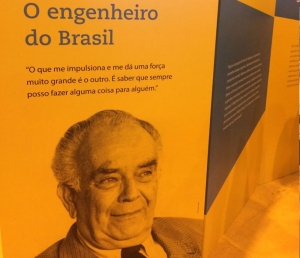


(Posted on 21/06/18)
With immense sadness, Vale has announced the passing of Eliezer Batista, the first person to hold the main position within the company. A two-time president of what was then, Companhia Vale do Rio Doce, Eliezer laid the ground work for the growth that would take place from the 1980s onwards, creating a long-term and large-volume ore marketing strategy with Japanese steelmakers.
In his first reign as president from 1961 to 1964, to support the planned growth, Eliezer planned the Port of Tubarão, in the state of Espírito Santo, as there was a need for a port capable of receiving vessels of up to 150,000 tons - although most of world’s fleet did not exceed 60,000 tons. This innovative idea enabled Vale to double the volume of its exports. During this period, Eliezer was also Minister of Mines and Energy (1962-1964), holding both positions.
Eliezer Batista was appointed by President Jânio Quadros at age 36, position he held from 1961 to 1964. In 1962, Vale signed the first long-term contracts with 10 Japanese steel mills, to supply 50 million tons of iron ore for a period of 15 years. In return, the Japanese helped build Tubarão. Eliezer's vision was interrupted by the Military Coup where he was accused of being a communist. He lived with this accusation for a number of years and was ultimately dismissed from the presidency of Vale
The engineer from the small mining town of Nova Era, Minas Gerais, would only return to Vale in 1979. His main challenge: to implement the Carajás Project, in the middle of the Amazon jungle. National money was scarce and the second Oil Crisis was knocking on the door. Eliezer did not give up and three times went to the World Bank for a loan and even managed to convince the bank's almost unbreakable chairman, Robert MacNamara, a former US Secretary of Defense in the governments of John Kennedy and Lindon Johnson.
Carajás was budgeted at US$4.2 billion. But, thanks to the organization and the sense of public responsibility of those involved in the project, all the planned projects - mine, railroad and port, in addition to all the increase in social and infrastructure areas – cost US$ 2.8 billion. Everything was delivered within the agreed timescales.
In 1986, Eliezer left his presidency of Vale. Thirty years later, in 2016, he would lend his name to the largest project in the history of world mining: the S11D Eliezer Batista Complex, the first iron mine built with the least possible environmental impact in mind; without trucks, allowing for a 70% reduction in diesel consumption.
“Today, we are sad. Our greatest engineer, the man to whom we owe practically everything to, has gone. Eliezer Batista, who once earned the nickname "Engineer of Brazil", could also be known by another nickname: "the Builder of Vale". Yes, we are proud to say that we were his main work. And he, in turn, was Vale's work.” said Vale's CEO Fabio Schvartsman.
Rio Tinto and BHP have agreed to work together to extract up to 200 million tonnes of iron ore at their... Read more
SOHAR Port and Freezone has signed a USD 50 million investment agreement with Oman Zinc LLC, to develop... Read more
The National Grain and Feed Association (NGFA) in the USA has applauded the Surface Transportation Board... Read more
Rio Tinto have released the following statement regarding their recent discussions with Glencore:&ldquo... Read more
ADM and Bayer have announced a three-year extension of their partnership to support farmers in Maharashtra... Read more
The National Grain and Feed Association (NGFA) has applauded Senator Deb. Fischer’s (R-Neb.) reintroduction... Read more
Anglo American plc and Teck Resources Limited have received regulatory approval from the Government... Read more
The Rhodes Ridge Joint Venture has approved a $191 million (A$294 million) (Rio Tinto share $96 million... Read more
Trafigura Group Pte Ltd, a global leader in the commodities industry, has announced its financial results... Read more
Rio Tinto has successfully produced the first copper from the Johnson Camp mine in Arizona using its... Read more